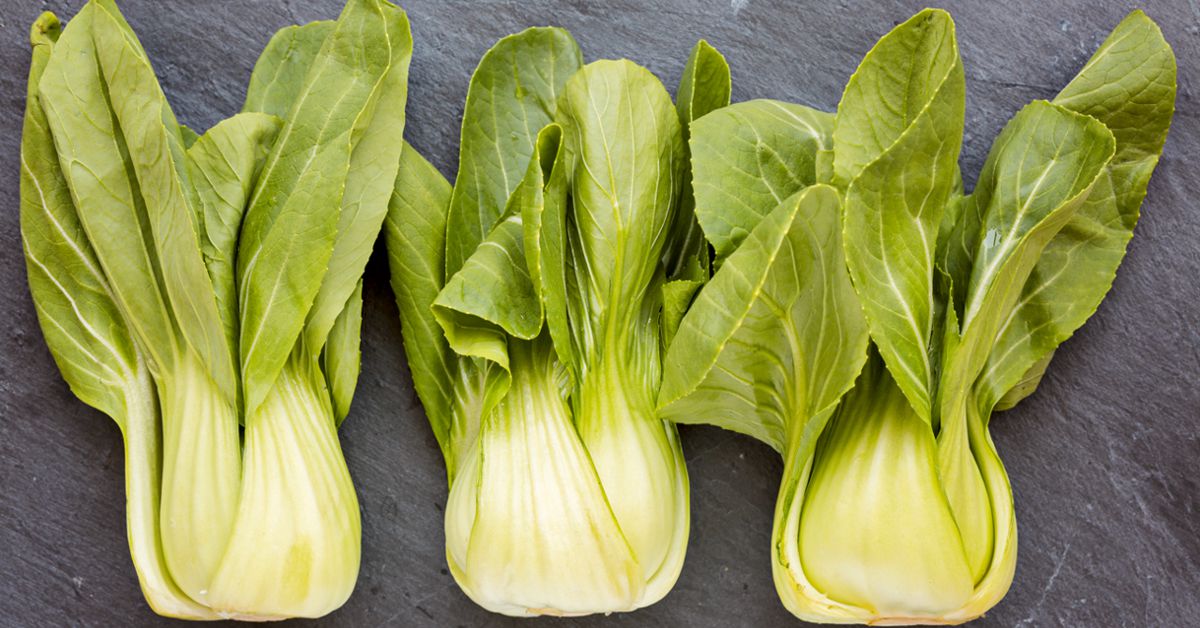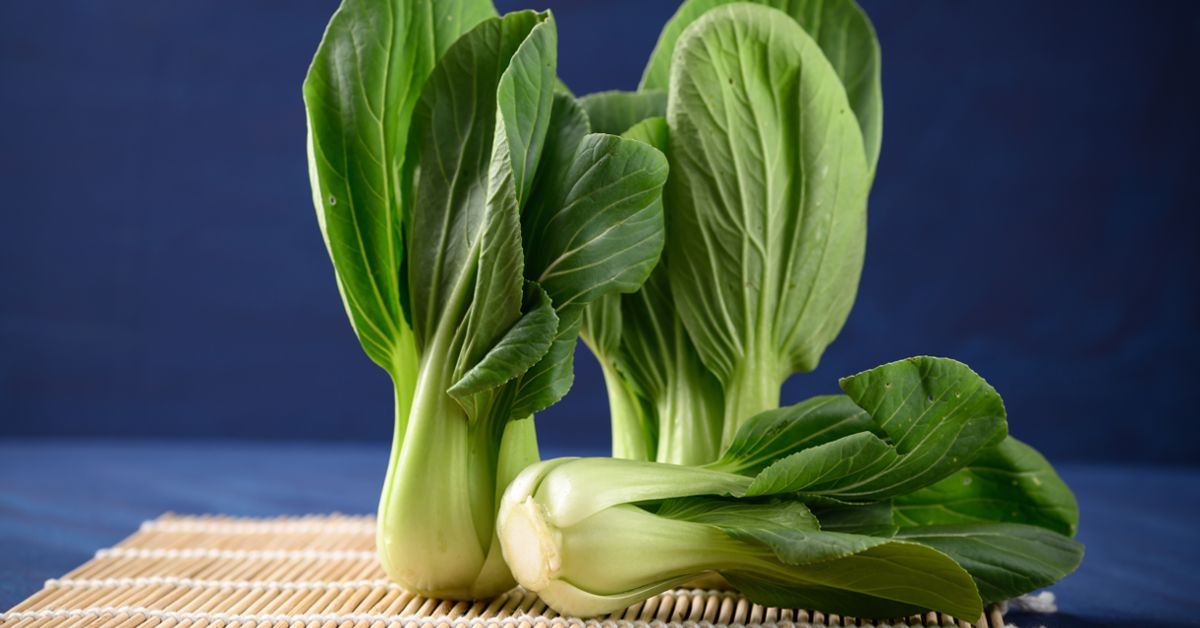Asian greens are a diverse group of leafy vegetables native to the Asian continent, known for their rich nutritional content and versatile culinary uses.
They can be found fresh or frozen at many supermarkets and specialty grocery stores. Each type of Asian green has its own unique flavor and nutritional profile.
Some common types of Asian greens include bok choy, napa cabbage, tatsoi, mizuna, and Chinese broccoli:
- Bok choy, also known as Chinese cabbage, has a crunchy texture and a mild, slightly sweet flavor. It is often used in stir-fries and soups and is a good source of vitamins A and C, calcium, and iron.
- Napa cabbage is a long, slender cabbage with a crisp texture and a mild, sweet flavor. It is commonly used in salads, slaws, and stir-fries and provides a good source of vitamin C and fiber.
- Tatsoi, or rosette bok choy, is a small, round leafy green with a mild, slightly sweet flavor.
- Mizuna, or Japanese mustard greens, has a spicy, slightly bitter flavor. It is often used in salads and stir-fries and is rich in vitamin C and iron.
- Chinese broccoli, also known as gai lan, features thick, crunchy stems and small, tender florets. It has a slightly bitter flavor and is commonly used in stir-fries and soups. It is a good source of vitamin C, calcium, and iron.
In addition to these, other types of Asian greens include choi sum, tat soi, and yu choy. These greens are also available fresh or frozen and can be used in a variety of dishes to enhance flavor and nutrition.
Benefits and Nutrients of Asian Greens
There are many benefits to eating Asian greens.
They are low in calories and high in fiber, making them an excellent choice for weight loss and maintaining a healthy weight.
They are also high in nutrients such as vitamins A and C, calcium, and iron, making them a great choice for overall health and wellness.
Some of the main nutrients found in Asian greens include:
- Vitamin A: This vitamin is important for maintaining healthy vision, skin, and immune function.
- Vitamin C: This vitamin is important for maintaining healthy skin, teeth, and gums, and it is also a powerful antioxidant.
- Calcium: This mineral is important for strong bones and teeth.
- Iron: This mineral is important for carrying oxygen to the body's cells and tissues.
In addition to these nutrients, Asian greens also contain a wide range of other beneficial compounds, including flavonoids, polyphenols, and other antioxidants.
These compounds help to protect the body against oxidative stress and may have a range of health benefits, including reducing the risk of chronic diseases such as heart disease and cancer.
Asian greens are also a good source of fiber, which can help to promote healthy digestion and may also help to lower cholesterol levels.
Recipes with Asian Greens
Breakfast
Spinach and Egg Breakfast Wrap: Combine scrambled eggs, cooked spinach, and diced tomatoes in a tortilla for a quick and easy breakfast wrap.
Sauteed Bok Choy and Tofu Scramble: Sauteed diced bok choy and tofu with your favorite spices and served with toast for a protein-packed breakfast.
Kale and Avocado Smoothie: Blend kale, avocado, banana, and your choice of milk or yogurt for a healthy and refreshing smoothie.
Collard Greens and Egg Breakfast Sandwich: Top a slice of whole grain bread with a fried egg, sliced tomato, and a few leaves of collard greens for a satisfying breakfast sandwich.
Mustard Greens and Sausage Breakfast Skillet: Sauté diced sausage and mustard greens in a skillet and served with scrambled eggs for a hearty breakfast.
Lunch
Sesame Noodles with Bok Choy: Cook soba noodles according to package instructions and toss with sesame oil, diced bok choy, and sliced scallions.
Stir-Fried Napa Cabbage with Chicken: Stir-fry diced chicken, napa cabbage, and your favorite vegetables in a wok or large skillet.
Kale and Quinoa Salad: Massage kale with a little lemon juice and olive oil, and then toss with cooked quinoa, cherry tomatoes, and diced avocado.
Spicy Collard Greens and Black-Eyed Pea Soup: Combine cooked collard greens, black-eyed peas, and spices in a pot and simmer until heated through.
Mustard Greens and Tofu Stir-Fry: Stir-fry diced tofu and mustard greens with your favorite vegetables and serve over rice.

Dinner
Chinese Braised Bok Choy: Braise bok choy in a mixture of chicken broth, soy sauce, and sugar until tender.
Sesame Kale Salad: Toss kale with a sesame dressing and top with sliced almonds and sesame seeds.
Spicy Collard Greens and Shrimp: Sauté collard greens and shrimp with a spicy sauce until heated through.
Napa Cabbage and Beef Stir-Fry: Stir-fry diced beef and napa cabbage with your favorite vegetables and serve over rice.
Extra benefits of Asian Greens
There are many extra benefits to eating Asian greens beyond their nutritional value.
For example, they are a great source of antioxidants, which can help to protect the body against the harmful effects of free radicals.
They are also a good source of anti-inflammatory compounds, which can help to reduce inflammation in the body and lower the risk of certain chronic diseases such as heart disease and cancer.
In addition, Asian greens are very versatile and can be used in a variety of dishes, from soups and stews to stir-fries and salads.
They can be used as a substitute for other leafy greens in recipes, and they can also be used to add flavor and nutrition to smoothies and juices.
Overall, Asian greens are a healthy and delicious addition to any diet, and they offer a wide range of benefits for both physical and mental health.
Whether you are looking to lose weight, improve your overall health, or simply want to add more nutrients to your diet, adding Asian greens to your meals is a great way to achieve your goals.
Good bye!
Thanks for reading! If you found this article helpful, please save our site in your bookmarks and share it.
For more articles just like this one, check out our Nutrition section here on woman vitality.
References
Rose, P. (2005). Protective effects of Asian green vegetables against oxidant induced cytotoxicity. World Journal of Gastroenterology, 11(48), 7607. https://doi.org/10.3748/wjg.v11.i48.7607
Foster, V. (2021, October 15). The nutritional value of Asian greens. The Farmers Store Byron. https://thefarmersstore.com.au/blogs/news/the-nutritional-value-of-asian-greens#:~:text=It%20contains%20Vitamins%20C%2C%20betacarotene,as%20cancer%20and%20heart%20disease.

Leave A Comment